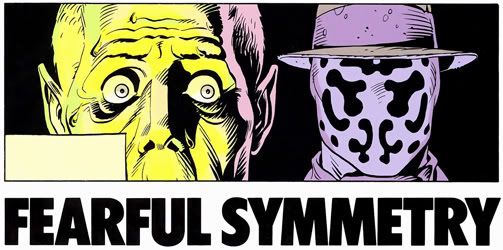
Alright! We doing this! Come on, Greatest Graphic Novel of All Time! Bring your Hollywood Blockbuster brother! I ain’t care! It’s on!
So, yeah, I saw Watchmen. I’d read the book several times – and reread it again in the days leading up to the film’s release, which, in hindsight, may not have been the best idea. But it’s clear that those who have read the book will have a pretty different viewing experience from those who are coming in with fresh eyes.
If you’ve never read the comic, written by Alan Moore and illustrated by Dave Gibbons, I honestly have no idea if you’ll enjoy the film. And I’m not sure that reading my review will be of much help to you. But I’ll try a quickie. The film looks amazing. Production design is awesome, special effects generally great, good fight sequences that aren’t too overdone. Patrick Wilson is particularly great as the nebbish Nite Owl, and Jackie Earle Haley’s intense few scenes out from under Rorschach’s mask are really satisfying. Most of the rest of the acting is good, though there are some weak links, and a few line readings fall flat. The retro soundtrack is pretty killer. And the plot moves so fast you can’t help but get swept up in its velocity; whether you can follow the intricate plotting or not, you’ll never be bored. At best, you’ll come out of the theater wanting to read the comic (and if so, good! Go out and buy a copy, you won’t regret it). At worst, you’ll be entertained for two and a half hours, and will have forgotten about most of it after a week or so.
But if you have read the comic before, or want to know how it translated – we’ve got a lot to talk about! And I am going to talk about a lot, including the ending, so here’s your Spoiler Warning! Come back later if you need to.
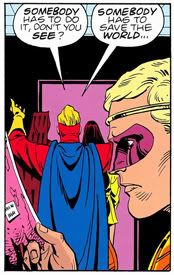
More than a few people have called Watchmen “unfilmable”, and while I don’t agree with that in a literal sense (in a perfect world, it would make a great miniseries or even a series of films), it makes sense from a practical standpoint. The
A lot had to be taken out, obviously, but most of what’s there is slavishly faithful to the comics, for better or for worse. While most of the memorable images from the book have been recreated verbatim, so has a lot of dialog that sounds like it came from, well, a comic book from 1985. Some of the lines have not aged well. Many of the heroes’ costumes look pretty awful, but that was true in the comic, too (poor Doctor Manhattan went through four “outfits” in the series, and the least offensive, ironically enough, was his birthday suit), and I think that actually works to the benefit of the story, adding “lack of fashion sense” to the litany of flaws these characters have.
The story itself moves at a breakneck pace. It has to: there just isn’t enough time to get through everything the filmmakers want to tell, even after pruning almost half the plot of the book. And although there are a few times where the speed prevents a few character moments from really transcending, by and large I think the writers did a great job distilling everything into as compact a package as possible (especially the new ending, which I’ll get to in a moment). Yes, everyone has a favorite scene or character or theme that was cut, but that’s the nature of the beast. And the filmmakers are at least able to throw in references to the omissions where they could: the excellent and complex production design is full of fanboy nods, from the Gunga Diner blimp to the post-disaster Millennium billboards. Though Bernie the newspaper vendor and Bernie the young reader don’t get a story, we do see two extras obviously meant to be them during the climactic scene of disaster, so it’s not difficult to imagine that their story has been going on, perhaps in the theater next door. Even Laurie’s childhood snowglobe is there, if just for half a second. Snyder and co. earn a lot of goodwill from me just by making the extra effort to at least imply the presence of details that couldn’t be thoroughly examined.
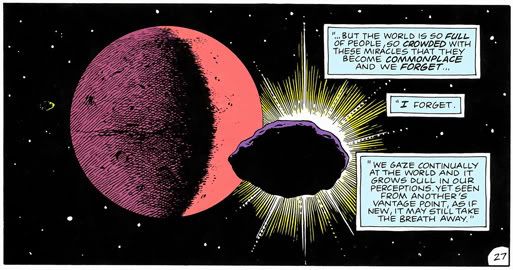
But the film’s emulation is so exacting that the few moments of actual innovation feel out of place. Though most of the heroes in the story (actually called “The Watchmen” several times in the film, though not once in the novel, interestingly enough) are portrayed as sad-sack, out of shape or out of touch, each of them gets one or two shiny new Bad-Ass Fight Scenes, which may annoy the purists but were probably added to appease everyone else. And certain characters, once normal humans, can now punch through concrete and survive multiple-story jumps – also presumably for spectacle. It does kind of go against
The biggest change comes at the end of the story, and by and large I think it actually works really well. Ozymandias’s manufactured threat now comes in the form of framing Dr. Manhattan, and though I miss the squid, it’s kind of astonishing how easily this new ending fits into the story, with far less exposition needed than having to detail secret islands and missing artists and psychic bombs. Going into the film knowing that the ending would be different – but not how – I actually grew really excited during the final scenes in
There were only two changes that really bothered me, and the first is admittedly not a huge deal and more of a fanboy rant, so bear with me. The original Watchmen graphic novel is absolutely stuffed with visual symbolism – reflections, mirroring, image transposition, and, especially when Rorshach is involved, symmetry. Everything in the man’s life is symmetrical, from his mask to the locations he visits to the page layout of issue five. The effort Moore and Gibbons took to impress this upon the reader borders on obsession. So I was fascinated to note, upon rereading the book, the panel following Rorschach’s death in Antartica. Essentially exploded by Doctor Manhattan, all that remains is a spatter of blood on the snow. But where you might expect further, morbid symmetry, the remains are instead wild and random. There is no symmetry in Rorschach’s death, and purposefully so. But in producing the film, Snyder or Hayter or someone must have noticed the omission but missed the significance of it, because the film proudly displays a giant Rorschach blood blot in the snow; a perfectly symmetrical image that the camera lingers on so long that it kind of becomes the morbid punchline of the character’s existence. Zach astutely noted that morbid punchlines are exactly what Watchmen is all about, and that’s true, but I still feel it did the character a disservice that was actively avoided in the source material.
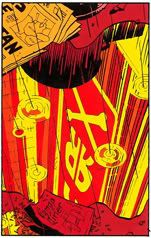
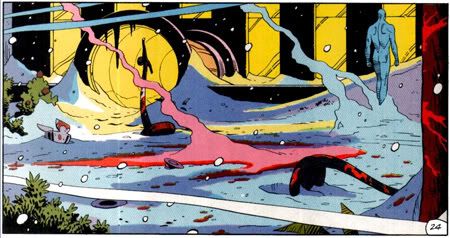
The other negative is far more significant, though it actually begins at almost the same time. In the film, Nite Owl witnesses Roshach’s death, and his reaction is the typical melodramatic “Nooooo!” which results in another failed fistfight with Ozymadias. “You haven’t saved humanity”, Nite Owl says, “You’ve twisted it! Perverted it!” And then he and Silk Spectre exit the building, looking down their noses in Moral Judgment at Ozymandias. Oz’s last scene in the film is a lingering shot standing alone and sad in his ruined home, ostensibly contemplating what’s been lost. As Dan and Laurie begin a happy life together, if not a new one (they appear to continue their costumed adventuring, which is a huge misread of the book’s intent), the film seems to be saying that they were in the clear moral right, that the ends did not really justify the means. Though it’s fine for some of the characters to voice such an opinion, the book itself never takes sides. Rorshach, the only one whose life was black and white, is gone, and the others continue to live in varying shades of gray. It’s one of the great and most unique moments of the entire story (especially for a mainstream comic book), and not a difficult one to understand. So it feels strange and false for the film to actually go to the same dark point the book did, only to make a moral apology for it after the fact. By the end of Watchmen the comic, there are no heroes left; our protagonists are either dead or complicit in the deaths of millions. But Watchmen the movie tries to have it both ways, making the tenuous argument that Dan and Laurie will keep
Was that change (or any of the others made) truly severe enough to justify

6 comments:
I completely agree regarding the changing of the ending. I was so excited for suddenly not knowing what was coming next! Although it was a bit of a raw deal for Manhattan, I think it worked really well. In fact, it almost kept the story more grounded in reality than the giant psychic squid bomb. My quibble was that I would have like a minute of silence and lots of dead bodies. I felt that the studio overriding that imagery blunted the emotional impact of Adrian's decision just a tiny bit.
I disagree a bit about the ending shots. While the camera lingers on Oz, I thought he was only feeling remorse for the people that died (as he says at one point, 'I've made myself feel every death' or something to that effect), but still justified. And I didn't think Nite Owl and Laurie were still running around? They seemed sort of domesticated at the end, to me. All in all, I got the sense that the movie leaned towards Oz's viewpoint. But maybe that's because I end up siding with Adrian, so I view it through that lense.
I think you're pretty spot on. I get that Ozymandias was supposed to be really strong, but the Comedian punching through the wall was a bit weird, I thought. Overall, I really enjoyed it. I want to go see it in IMAX.
You didn't like V for Vendetta?
Things were admittedly ambiguous with Dan and Laurie at the end. But he did mention "upgrading Archie", which (combined with the film totally dropping the idea that society had started to hate costumed heroes all over again) seems to leave possibilities for superheroing - and a sequel - wide open. The idea of a Watchmen II seems so bizarrely awful that I'm actually kind of morbidly curious about it.
V wasn't bad; it looked great, and I'm sure the Wachowskis did a better job than most would have. I didn't mind transposing it onto present day, but it suffered from some other really questionable changes (especially trying to shoehorn in V crushing on Evey), and I think I would have enjoyed the film a lot more if I hadn't read the book first. But I also think it's just difficult to pull off a film so heavily invested in a long-winded protagonist who constantly pontificates from behind an unmoving mask, regardless of who's behind the camera. And I think the filmmakers gave it a good shot but couldn't quite nail it.
How about Watchmen II: Electic Squidaloo?
I saw V for Vendetta before reading the book, which probably helped because I was able to love the film and then discover all the extra plotting and characters of the book. I agree the Evey/V relationship was kind of bizarre and squeezed in. But I did think the overall revolutionary themes translated well. Or maybe I was just very ready to go riot at the white house at that point...
Definitely. I kind of wish I'd seen V before I read it for exactly that reason.
Alright Chris, I wouldn't have left you a message on facebook if I knew you were already ranting about it here. Dude, I cant believe that people are reading that deep into the movie. At first, I was just watching the movie cause it looked like it might have coolg graphix, then the plot thickened within the various storylines going on which really drew me in. I did wanna know who those people were and what they were about. But once again, I DID love "The retro soundtrack" that was "pretty killer" I know that's really not the proper way to quote...chuckles..And I think it helped that I knew absolutely nothing about it. Ps...listerning to your playlist. I LIKE.
Great and thoughtful review. Especially good points about Rorschach's death.
I wanted to add another point in regards to the reimagined ending. While I thought the switch from Interdimensional Squid Alien to Dr. Manhattan was actually a neat and contained way to go, I thought it caused some interesting issues in overall theme. I felt as though the original ending left humanity feeling as though there was nobody (no god, no heroes) really capable of watching out for them, so they ought to get their acts together and watch out for themselves. I felt as though humanity, after the psychic squid bomb, was forced to grow up psychologically and socially and get along with each other. By positioning Dr. Manhattan in the role of squid, and creating a "you better play nice or I'ma come and nuke you guys again" cover story, humanity has to band together not in maturity, but as kids under a vengeful parent. The end result is the same, people come together, the nuclear clock is stopped, but the psychology behind it feels radically different.
Again, I thought it WORKED within the context of the movie, I just thought it sorta changed the subtext significantly.
Also: in regards to V for Vendetta, I think the biggest problem for the movie adaptation (which I loved, actually) was that it attempted to be too cut and dry, by creating a conspiracy theory to place the government in power. In the original, I felt as though the story and V both believed that it wasn't a "corrupt government" that was the problem, it was that government couldn't possibly exist WITHOUT individuals sacrificing their self-agency in some way. Thus V's revolution in the end is positioned more as a regime change than anything truly revolutionary and/or evolutionary.
(Once all is said and done, I think the V film holds up better as a movie than Watchmen.)
Post a Comment